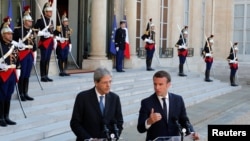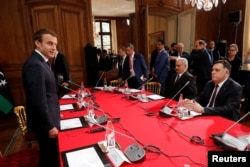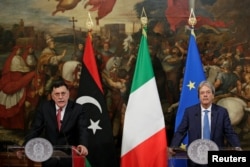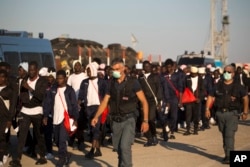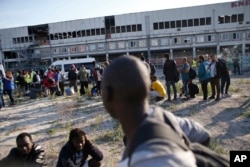In the first flush of enthusiasm for France’s Emmanuel Macron, the fresh young politician who upended French politics and snatched his country’s presidency this year, Italian politicians were no different from European counterparts in seeing him as a JFK-type figure who'd help Europe overcome major challenges — from Brexit to the migrant crisis.
But Italy is quickly falling out of love with Macron and irritation with France’s president is mounting in Rome.
Tensions have crept into diplomatic relations between France and the government of Paolo Gentiloni, prompted by Macron’s response to Italian pleas for more European assistance with the mainly sub-Saharan migrants crossing the Mediterranean in record numbers and his largely uncoordinated diplomatic intervention this week in the Libya crisis.
On Tuesday, Macron oversaw a meeting in Paris of the leaders of two of war-torn Libya’s rival factions to discuss a political power-sharing deal to reunite the fractured north African country.
The meeting between the head of the U.N.-backed government of Prime Minister Fayez al-Sarraj, which has failed to assert authority, even in the Libyan capital, Tripoli, and General Khalifa Haftar, a warlord who largely controls the east of the lawless country, was not coordinated with the Italian government.
Gentiloni’s ministers took the unusual step of openly criticizing the French president this week, voicing their frustration with Macron’s efforts, which they argue distract from a coordinated U.N. and European Union effort to engineer a political deal in Libya between three rival governments and dozens of militias.
“There are too many open formats in Libya, too many mediators, too many initiatives,” Italy’s foreign minister, Angelino Alfano, told the Italian newspaper La Stampa.
He and other ministers are dismissive of the progress the Elysee Palace claimed Tuesday to have made in the search for a deal in Libya. According to the French government, al-Sarraj and Haftar have committed to a cease-fire as well as to a continued political dialogue in an effort to achieve national reconciliation.
The Italians believe Macron has fallen into a trap set by General Haftar, who has refused to accept the legitimacy of Fayez al-Sarraj’s government. Italian officials complain that the Macron-brokered meeting helps to legitimize Haftar, whom they see as a warlord and a strongman-in-the-making.
Officials in the Italian capital say Italy is far more of a "front-line" state when it comes to Libya and suffers more immediate impact than France when it comes to political developments on the other side of the Mediterranean.
'Juvenile authoritarianism'
And they accuse Macron of brashness in waiving off Italian objections, arguing he’s being too high-handed. The charge of high-handedness has been echoed this month, too, in France, on his approach to a range of issues, domestic and foreign, with one retired general, Vincent Desportes, accusing Macron of “juvenile authoritarianism.”
French officials counter that the Italians are being naive if they think there can be any lasting deal in Libya that excludes Haftar, who’s backed by Egypt and the United Arab Emirates. “Haftar is not going away — he has to be part of the solution,” an official in France’s Foreign Ministry told VOA.
Macron’s Libya diplomacy is just one irritant in increasingly tension-filled Franco-Italian relations. In May, after meeting Gentiloni in Paris, Macron announced: “We have not listened enough to Italy’s cry for help on the migration crisis.” But Macron’s position since hasn’t changed much from Francois Hollande, his predecessor in the Elysee Palace, to the Italian government’s rising anger.
Burden-sharing
Italian pleas for more burden-sharing by other EU countries have, so far, fallen on deaf ears. Italy’s refugee centers and shelters have reached their capacity of 200,000. So far this year nearly 100,000 asylum seekers have crossed the Mediterranean from Libya — a 17 percent increase over the same period last year — and with months more of good weather, another 100,000 asylum seekers are likely to land at Italian ports.
This month, Italy’s deputy foreign minister, Mario Giro, complained, “it doesn’t seem like France wants to help us concretely.”
French police are blocking hundreds of migrants on the Italian side of the border at Ventimiglia from entering France; the French government is refusing to allow asylum seekers rescued in the Mediterranean from landing at French ports and, like nearly every other EU country, France hasn’t come anywhere near meeting its quota of migrants as agreed to under a 2015 EU refugee relocation scheme.
Macron this month talked of distinguishing between war refugees and economic migrants, indicating that France won't admit any asylum-seekers who are just escaping poverty and hunger. But that doesn’t help Italy as it tries to cope with a mounting influx of mainly economic migrants, who, under EU rule, it has little alternative but to admit, at least for processing and to save lives.
Paris has also scorned an Italian proposal for an EU military mission to monitor and interdict migrants along Libya’s southern border. Italians question why a large French military mission in Niger isn't being used to disrupt migrant trafficking when it is right by the main route being used by smugglers and would-be asylum seekers traveling north.
Last month, the European Parliament’s most senior left-wing politician, Italian Gianni Pittella, launched a scathing attack on Macron after French police frogmarched back into Italy more than 100 migrants who’d crossed into France.
“The situation is shameful. Italy and the Italians are being abandoned, they’re being expected to deal with all these migrants on their own with no support,” he said.




